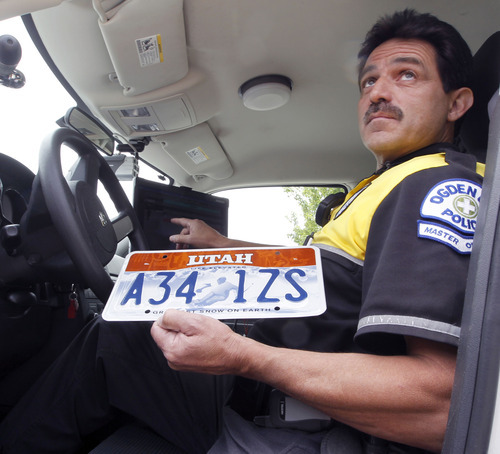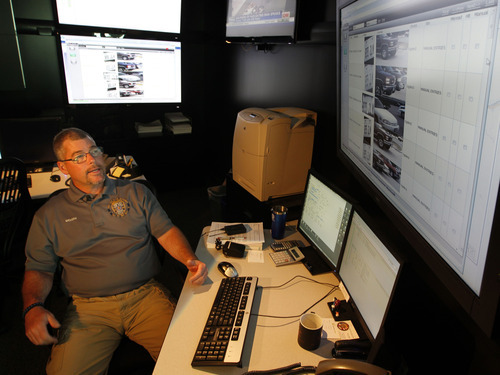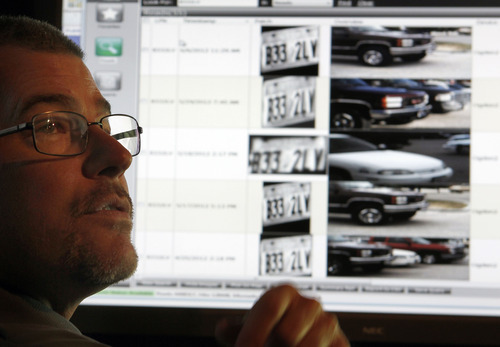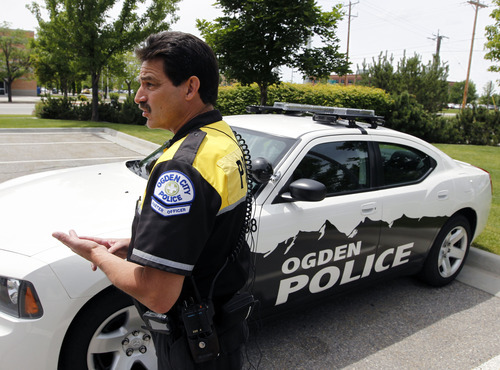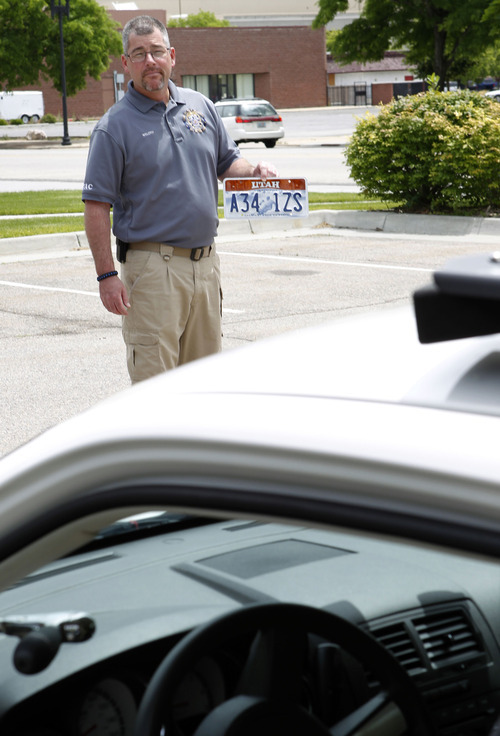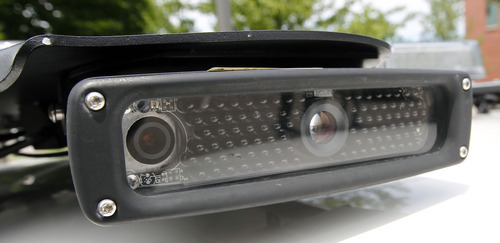This is an archived article that was published on sltrib.com in 2012, and information in the article may be outdated. It is provided only for personal research purposes and may not be reprinted.
Drive your car over aspen-covered Boulder Mountain in southern Utah or park it in downtown Salt Lake City or on the Brigham Young University campus in Provo and you can expect something to happen.
A scanner will record your license plate, where it was and when.
The recent request by the Drug Enforcement Administration (DEA) to mount license plate scanners on Interstate 15 in southwestern Utah met opposition, but law enforcement across the state, including police at BYU, are already using license plate scanners to find everyone from parking scofflaws to violent crime suspects.
Even before the DEA request, southwestern Utah had a concentration of license plate scanners. The St. George Police Department has its own scanner, while other police forces in that county are on a list of agencies that can borrow a car from the Utah State Tax Commission equipped with scanners. The drug task force that covers Iron and Garfield counties also has a license plate scanner it has used to build cases against people suspected of growing marijuana on public lands.
A Salt Lake Tribune review identified 47 police departments and county sheriffs who use license plate scanners or have permission to borrow the Tax Commission scanner cars. Statewide agencies, including the Utah Highway Patrol, also use the scanners.
The most extensive use of scanners is at BYU, where perhaps every license plate that rolls onto campus is documented.
State officials say the data are secure and claim the way license plates are scanned does not violate the law or the Bill of Rights.
"This is as far from profiling as it gets," said Sgt. Curtis Stoddard, of the Utah Motor Vehicle Enforcement Division. "The cameras don't profile. It reads a plate and if something is wrong with it, it's going to tell you."
The Tax Commission purges scanner data after a year. But the American Civil Liberties Union (ACLU) and a few conservative legislators are raising questions about how and why Utah is keeping some license plate information for that long.
Marina Lowe, legislative and policy counsel for the ACLU of Utah, said the data could be used in a way that violates a person's rights if, for example, license plate information is used to target drivers who frequent liquor stores as potential drunken driving offenders.
"It sort of brings into question whether people will be chilled in their ability to participate in certain activities," Lowe said.
—
Bad boys, bad boys •License plate scanners are often referred to as license plate recognition, or LPR in police lingo. They can be mounted on cars or in stationary positions.
The scanner records the license plate number — though not the state that printed it — a picture of the front or rear of the car, the date and time and the GPS location of the car. Since the LPR doesn't detect which state the plate is from, the operator has to radio to a dispatcher or connect to a second database to verify he or she has really spotted a stolen car and to learn who the registered owner is.
Typical LPR vehicles have scanners mounted in the front and on the sides. They can scan plates when both the LPR and the passing car are moving at 80 mph and at distances up to 29 feet away between the front and side cameras.
The nerve center of LPRs in Utah is at the Tax Commission. The Tax Commission operates the Utah Division of Motor Vehicles and has jurisdiction over vehicle-registration laws and seeks to recover stolen cars. The Tax Commission used a Department of Homeland Security grant to buy its first LPR in 2004 and mount it on an unmarked car. Now the Tax Commission has a total of 10 cars, five of which are loaner LPR cars.
Stoddard, who oversees the Tax Commission's scanner program, says the LPRs are programmed to look for vehicles reported stolen, expired or with revoked registration, no insurance or which have been entered in a national database as associated with a missing person or Amber Alert or a vehicle the federal government has designated as linked to a terrorist suspect.
Recovering stolen cars continues to be the primary purpose of the Tax Commission LPRs.
The onboard computer plays "Bad Boys," the song made famous by the television show "COPS," when it scans a plate suspected of belonging to a stolen car. Stoddard, in a hearing before the state legislative committee last week, estimated Tax Commission LPRs are recovering 1,000 stolen vehicles a year.
—
Drugs, gangs, parking spots •But other police departments use their LPRs for more. The LPR policy at the St. George Police Department, for example, says the LPR is supposed to be driven to crime scenes to record what cars are there.
The Unified Police Department allows its officers to manually enter the license plates of wanted gang members into its LPR to alert the officer when that plate is found.
The Iron/Garfield County Drug Task Force has driven its LPR car up and down scenic Highway 12 on Boulder Mountain to track trucks suspected of supplying marijuana fields.Before the task force received the scanner, its commander, Dave McIntyre, had a list of suspect license plates written on paper.
"If I could build my own database of those known vehicles, I could go over on the highway and it would tell me when they go by instead of having to go through a [paper] list," said McIntyre, who now works for Cedar City police.
In Salt Lake City, the police department doesn't have its own LPRs, but the city's parking enforcement division does. One Jeep with an LPR drives across the city cross-referencing with the Tax Commission database cars as well as a city database of outstanding parking tickets. If the LPR finds a license plate with too many tickets, the operator will stop and place a boot on that car. The city plans to soon have four more Jeeps with LPRs.
Then there are the LPRs at BYU. The campus' LPR system was described last week by BYU spokesman Joe Hadfield and in an article published by Montreal-based technology provider Genetec.
BYU has stationary scanners mounted on the campus' perimeter "as a security measure, allowing the data to be mined after the fact," according to the Genetec article.
The school also has scanners mounted in parking lots that scan the plates of arriving cars and open a gate for drivers who have permission to park there. Two cars assigned to BYU's parking enforcement division also have scanners mounted on them to patrol visitor parking.
Hadfield said the LPRs are linked to law enforcement databases that provide Amber Alerts and other imported information. Hadfield said BYU keeps the LPR data for seven weeks.
Stoddard said BYU and the Utah Transit Authority are the only two LPR operators in Utah that don't share their data with the Tax Commission.
At the Tax Commission and the local agencies that participate in its program, the operator uploads the new scanning data to a state database at the end of every shift. The data are then stored in computers at the Tax Commission.
Police forces signing the agreement with the Tax Commission for data sharing and storage can also access the data later if they want to learn whether a license plate was in a particular location at a particular time.
"I kind of laugh at how it's been represented," McIntyre said. "It does not give that much information."
The fact that the LPR is not automatically tied into databases with names, addresses and other personal information is a privacy safeguard. As another safeguard, Stoddard said the Tax Commission only gives law enforcement agencies access to the data, and they have to be investigating a serious crime.
So if parents want to know whether their teen has been driving their car without permission, don't call the Tax Commission, Stoddard said. It won't access the LPR database to query your license plate.
—
Federal proposal •It wasn't clear to Utah lawmakers whether the DEA would implement such safeguards, and that was one reason for their skepticism when that federal agency approached state officials earlier this year.
The DEA asked the state for permission to mount scanners on the southbound lanes of I-15 in Beaver County and the northbound lanes in Washington County. Besides collecting license plate information to build cases against suspected drug dealers, the scanners would have been programmed to alert law enforcement when someone thought to be carrying narcotics passed by.
Local agencies could access the data, which is why the proposal had support from the Beaver and Washington county sheriffs, but the data also would be transmitted to a DEA office in Virginia, where it would be stored for two years.
The DEA has since withdrawn its request.
In another hearing Wednesday that addressed the state's use of LPRs, legislators asked whether the state should keep one year's worth of data.
Rep. Dan McCay, R-Riverton, suggested that, after a few months, private license plate data may be obsolete.
"If it's not going to lead to a [traffic] stop immediately," McCay said Wednesday, "the value of that data is gone."
Maj. Jeff Carr, of the Utah Department of Public Safety, disagreed. He told legislators police may not realize until months later that a crime was committed and detectives want the ability to review the LPR data. Carr said law enforcement would prefer to keep data longer than one year but understands the privacy concerns.
Sen. Todd Weiler, R-Woods Cross, said his wife recently asked who cares about storing license plate data and that only guilty people have something to hide.
"My response was," Weiler told people in the hearing, "'Yeah, but our Constitution even protects somebody with something to hide.' "
ncarlisle@sltrib.com Twitter: @natecarlisle brensmith@sltrib.com Twitter: @brennanjsmith


